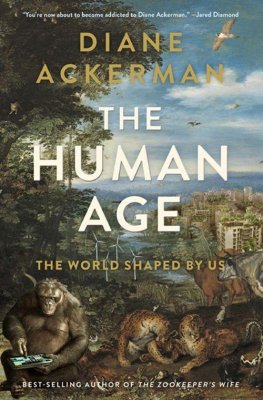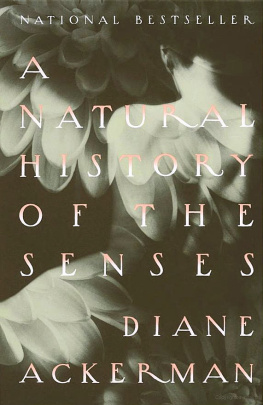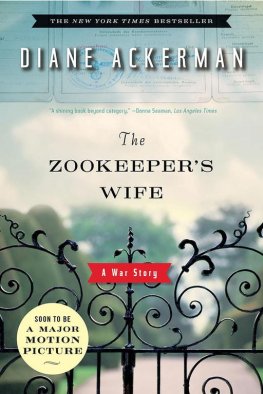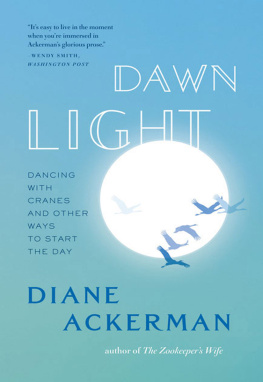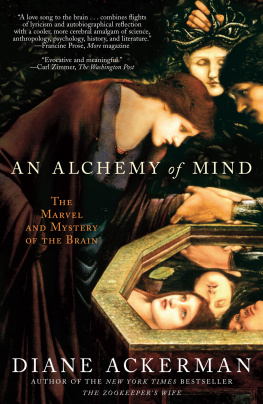Diane Ackerman
THE HUMAN AGE
THE WORLD SHAPED BY US
PART I
WELCOME TO THE ANTHROPOCENE
On a blue-sky day at the Toronto zoo, flocks of children squired by teachers and parents mingle excitedly between exhibits. Some kids pull out cell phones and send texts or snap pictures with the easy camaraderie of wired life. Clustered noisily along a large domed habitat thats been designed to look like a multistoried Indonesian forest complete with tree nests and meandering stream, they watch two orangutan moms and young weaving fluently through a maze of thick, flat vines, which in reality are fire hoses. Orangutans are the swivel-hipped aerialists of the ape world, with ankle-length arms built for sky-walking, opposable thumbs and big toes, swervy knees, and bowed ankles. As a result they can twist into almost any angle or pose. In amazement I watch a young female swing smoothly from vine to vine, then grab two with wide-spread hands and feet, flatten her hips, rotate her wrists, and hang still as an orange kite snagged in the treetops.
Even with knuckle-walking far behind us, we sometimes feel the urge to brachiate in that way, hand over hand on a playgrounds monkey bars. Yet were stiff-jointed and feeble by comparison. We may share 97 percent of our genes with orangutans, but they remain the ginger-haired tree-dancers and we the chatterbox ground-dwellers. In the wild, orangutans spend most of their lives aloft, maneuvering with pendulous grace, as they pursue mainly solitary lives, except during childrearing. Moms raise one kid every six to eight years, doting on their young and teaching them the ways of the forest, where edible fruits abound but must be safely judgedand some arent easy to peel or crack open because the rinds are either tough or spiked like medieval weaponry.
One of the orang moms swoops down to the ground as if on an invisible slide, picks up a stick, and fishes around inside a tree trunk until she snares edibles that she coaxes up and eats. The once-raucous students grow quietly transfixed as they peer at her skillful tool-using, especially the way she downs the morsels like eating peas off a knife.
Beyond the glade, well away from the crowds, I find a long-haired seven-year-old boy staring intently at an iPad and tapping the screen with one finger, which unlooses the pocket-sized roar of a lion followed by the buzzy honk of a flamingo. He glances at me with big brown almond-shaped eyes under a shag of thin auburn hair.
If my mane of black hair, frizzed wide in the heat, amuses him, he doesnt laugh. After holding my gaze for the sheerest moment, he turns back to his way-more-interesting iPad, gripping it with both hands, then with hands and naked feet. Surprisingly clean feet, I must say, and the largest hands Ive ever seen on a seven-year-old. My whole hand would fit into his palm.
But thats not unusual for a Sumatran orangutan, and Budi, whose name means Wise One in Indonesian, is growing quickly and starting to show signs of puberty: the peach-fuzz beginnings of a mustache and beard, and the billow of what will one day be a majestic double chin that puffs and vibrates when, as a two-hundred-pound adult, he gulp-warble-croons his operatic long call. Theres no sign yet of the giant cheek pads between the eyes and ears that will frame his face, acting as a megaphone to shoot his long calls half a mile through dense canopies.
His companion, Matt Berridge, is a tall, slender, forty-something, dark-haired man, holding the iPad near the bars so that Budi can play with it but not drag it off and deconstruct it. The zoos main orangutan keeper, Matt is the father of two young sons, both iPad devotees. Ape boys will be ape boys, after all.
The Apps for Apes program is sponsored by Orangutan Outreach, an international effort to help wild orangutans, whose bands are dwindling, and improve the lives of those in captivity around the world, by providing mental enrichment and more stimulating habitats. Nourishing the mind is a high priority because these great apes are about as smart as human three- to four-year-olds, and just as inquisitive. Clever tool-users, they wield sticks for many purposes, from batting down fruit to fishing for ants and termites. They fashion leaf gloves to protect their hands while eating thorny fruit or climbing over prickly vines. Day-dwellers, they fold a fresh mattress of leaves in the canopy before sunset each day. They lift leaf parasols overhead to shelter from extreme sun and fold leaf hats and roofs to keep off the rain. For drinking water, in a pinch, they chew and wad up leaves to make a sponge, then dip it into rain-filled plants. Before crossing a stream, theyll measure the water depth with a branch. They build dynamic mental maps of all the food trees in their leaf-cloud canopies.
And like their human counterparts, orangs enjoy playing with iPads. But theyre not addicted to them. Theyre just not as enthralled by technology as we are.
Like, I have a seven-year-old son, Matt tells me. Hes on it all the time. Not Budi.
This kid likes the luminous screen, but he wouldnt sit for cramped hours just staring at it.
How are we so enamored of this thing thats so unnatural and takes you away from everything? Matt asks. In one way, youd like to have your own kids occupied at times, but when you see that the orangs are never going to get obsessed with it, knowing their huge intelligence, it gets me thinking: How smart are we to spend all this time staring at this thing? Like, even myself, you know, I dont test my memory anymore. I go dee deedle dee dee. He demo-types on the screen. Ive become almost totally dependent on these machines. So am I weakening my brain?
Strawberry, a womans voice says as Budi taps the strawberry on the screen. Strawberry, she repeats when he finds a match. Matt rewards him with tidbits of fresh strawberries, apples, and pears. The lush tropical rainforests of Sumatra offer a cornucopia of hundreds of exotic fruits, the orangutans favorite fare.
Another appof pooling waterfascinates Budi. It looks like water, ripples like water, and when he touches it, it plashes and burbles. But it doesnt feel wet. And when he lifts his fingers to his nose, he doesnt smell water. From his sensory perspective, its strange. Not as strange, though, as interacting with humans and other orangutans via Skype.
The first time Budi saw Richard Zimmerman, the director of Orangutan Outreach, calling to him in a halo of light, he touched the screen, as if thinking, Hes talking to me. Then, puzzled, he reached over and touched Matts face. On the screen, a talking human, who knew him by name, was looking right at him and smiling, calling to him in a friendly voice. Why was Richards face flat and Matts face three-dimensional? Hed watched television lots of times, his favorite being nature films with orangutans. Matt sometimes showed him YouTube videos of adult male orangutans issuing their grown-up long calls, which always drew a fascinated stare. Yet the screen had never spoken to him. Hobnobbing with humans, rubbing shoulders with other orangs, meeting amiable strangers, playing with iPads, all had become staples of daily life. But this was an altogether different kind of socializing, and, although he didnt realize it, a step leading him deeper into the Human Age.
Parents today worry about the toll of screen time on their childrens brains; the American Medical Association recommends none at all before the age of two. Yet a tech-enthused parent can even buy a childs iPotty for iPad, a potty-training seat with built-in iPad holder, and find potty-training apps and interactive books at the iPad app store. Matt isnt concerned about Budis iPad play, because unlike his own boys, Budi is a casual iPad user, and no one has studied the effect of screen time on the brains of orangutans. Would it make their senses and our own more alike? Anyway, because Budi is growing up surrounded by zoo life, human technology and culture will influence his brain in myriad ways, just as it does the brains of children. For good or bad, we use our rich imaginations to transfigure the world for ourselves and other creatures, banishing some critters we regard as pests, while inviting others to share the curiosities weve invented (medicine, complex tools, food, special lingo, digital toys), urging them to blur the line with us between

